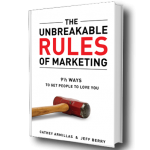Not everybody likes to write.
This post is not for professional copywriters, or professional writers (copy or otherwise). You guys can go about your business. The points I’m going to make here are for the normal 99.99% of people who hate to write, who equate writing with their worst days in school, who think they are bad writers, but who, nevertheless, frequently find themselves tasked with writing something–like the content for their own website, an e-mail, a white paper, a cover letter, a Dear John letter, a term paper, or even a blog post. My sympathy goes out to you. Which is why I’m being so saint-like in writing this post.
So I wanted to give some little tricks you can use to overcome your aversion to writing. That’s easy for me to say, I know, because I happen to like writing. I love it, in fact. Some even think I have a syndrome somewhere in the DSM (Diagnostic and Statistical Manual of Mental Disorders) that describes my compulsion to write. But they’re nuts.
But even though it is easy for me to say, and while I can’t make you love to write, I can at least point out some rules you can follow to just get on with it. They aren’t an exhaustive list, but they might be helpful. So here are some rules:
1. Write like you talk.
The mistake that most people make when they start writing is that they write like they think the thing should sound. They imitate what other, similar pieces sound like. But what they end up doing is stringing together a series of banalities that mean nothing. They use words like “passion” and “commitment” and “solution” and “leverage” as though they were little silicon implants, packed in there to flesh out the prose. And when you read that kind of writing, your eyes glaze over. In fact, you’d better not read it while driving.
But think about it. If someone were to talk to you like that in person, would you think they were crazy? Or mind-numbingly dull? Or just full of gas? Well, why would you write like that to them? If your eyes glaze over reading it, why would anyone else stay alert while they read your version of the same?
So write like you talk. This doesn’t mean you should use slang, or incomplete sentences (unless for effect), or bad grammar. This doesn’t give you permission to commit the “Me-I” pronoun error. Nor can you let typos slide. But it does mean that, as you write it, the piece should sound like it’s coming from a living, breathing human being. I always tell people to imagine you’re having lunch with the person you’re writing to. Write that script.
Some writers I know say it helps them to read what they’ve written out loud to themselves or a friend chained in their basement, to hear what it sounds like as a script. I don’t do this, of course, except in my head. But some people say it’s useful. Whatever the technique you use, keep thinking, while writing, that you are actually talking to another person.
The bonus to writing like you talk, is that you’ll talk prettier, too.
2. Show some empathy.
Besides their aversion to writing, nearly every sane person has an equal aversion to have to read bad writing. Have pity on them. They didn’t do anything to you. Why would you want to bore them to death? Think how many more people would read the user agreements to software licenses if they were written more with more empathy…or at least a with little more entertainment.
Pick somebody. If you can imagine for yourself a specific person you’re talking to while you write, it will help you enormously. Even though you may be writing something for millions to read (or dozens in the case of this blog), remember that they all read it one at a time. So pick one person out and think about them. Put yourself in their place. Would you want to read what you just wrote? Then rewrite it.
Speech coaches tell us, when we’re talking to a large audience, to pick out a friendly face or two in the crowd and make eye contact with them. It tends to make your speech more engaging because the eye contact is part of our social animal thing. Same goes for writing. You can’t make eye contact. But you can imagine it.
3. Put the gerunds down.
They’re evil, at least in place of actual, fully tensed-out verbs. This also has to do with the rule to write like you talk. Let’s say you bring a friend to lunch with the person you’re hypothetically writing to; would you say, “Introducing Monica.”? Or would you say, “This is Monica.”? See the difference? One sentence has a subject and a predicate, the other is just stupid. But how many times do you see ads or taglines written with the stupid gerund? “Introducing the 2013 Lexus!” “Announcing a breakthrough in the war on acne!” “Leveraging Solutions for a Brighter Tomorrow”.
The other problem with gerunds is that they epitomize the flattest, most passive voice. They reek of non-commitment. Generally it is better to lean toward a more active tone. It doesn’t mean you can’t ever use a passive “to be” verb. Sometimes it’s unavoidable (like in this very sentence). But just try to keep up and moving around. It’ll do wonders for your circulation.
So lay off the -ing verbs.
4. Read good writing.
My mom, who was a wizard in the kitchen, used to say that if you want be a good cook, you have to know what good food tastes like. The same applies to writing. Just immersing yourself in good literature can, by osmosis, improve your own output. The sound of language itself is musical. It’s often inspirational. The perfect word, a well-turned phrase, a memorable line are delights in themselves.
If you read good writing, then, or hear it in movies or speeches, then your brain will start to imitate it, just like it sought to imitate the “commitment to excellent solutions” kind of writing before. Reading junky writing is like eating junk food. The output (and your arteries) will suffer.
5. Watch the bangs, buster!
This is a special pet peeve of mine (and many of you already tease me like the playground nerd I am), but please, please, please, think several times before you put an exclamation mark at the end of your sentence. It doesn’t make it any more urgent. Or exciting. A bang doesn’t make up for a bad sentence anymore than Cool-Whip makes a stale cake better.
There are some who end every sentence with an exclamation mark. But, using the empathy rule above, don’t you see what this does? It comes across as yelling. And who likes to be yelled out? Okay, so you’re excited about the big news. Putting a ! on the end isn’t going to convey that excitement any more.
One of my first mentors when I was learning to write used to say that you should never use an exclamation mark unless somebody’s life was in danger. This is an exaggeration, of course. There are plenty of appropriate applications of bangs–“I’m going to be a father!” “Turn that racket down!” “The basement is flooded!”–but if you just shoot one off at the end of every sentence, regardless of content, you’re going to be out of bangs when something really important happens.
Challenge yourself. If you feel tempted, out of habit, to bang the end of a sentence you’ve written because you aren’t confident it conveys intensity, rewrite the sentence. After enough practice, you’ll wean yourself from bangs. Unless you really need them. I mean, really.
6. Strip out the extraneous, fluffy, superfluous, inessential, excessive, redundant, useless adjectives.
Some people seem to think that adding more adjectives to a noun will somehow bring the noun to life–like increasing voltage on the monster. Lawyers, in particular, seem to be adjective junkies. But look at any website and count the adjectives they don’t really need. Now look at yours.
But if you feel tempted to add them, think what would be lost if they were gone.
7. Practice. Practice.
Which, gets to me to practice. As with any skill, the more you practice writing, the better you’ll be at it. Think of any opportunity at the keyboard as a drill in honing your craft. You can even take time to write a better e-mail, a more thoughtful Facebook post, a text. Write poetry for yourself. Write short stories. Write essays. Set up a blog. Nobody has to read it. But you’ll become a much better writer. That is, if you want to be.
Or, you can always hire people like me.

